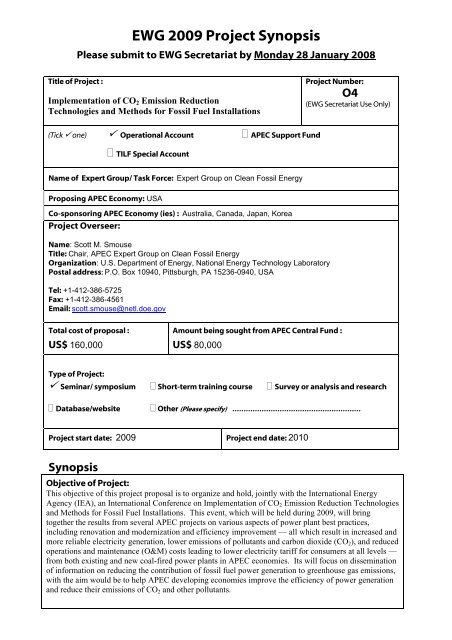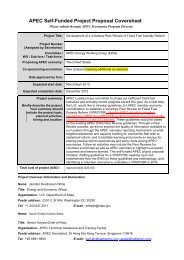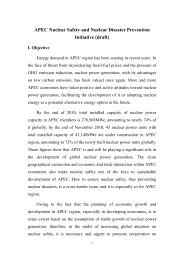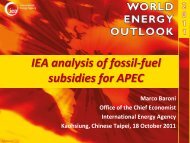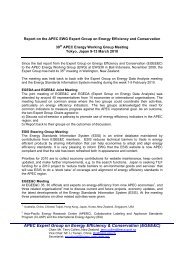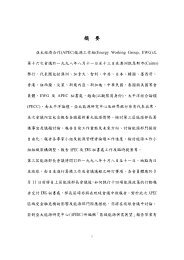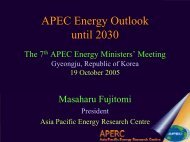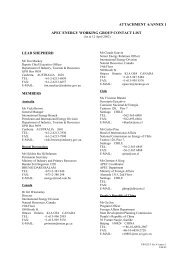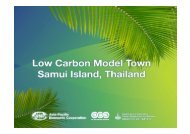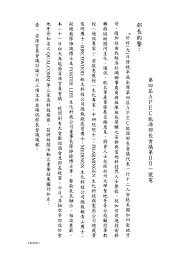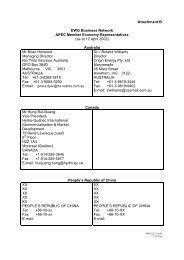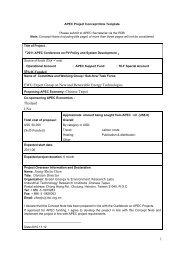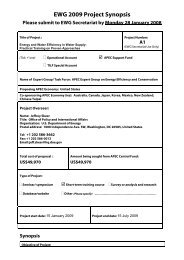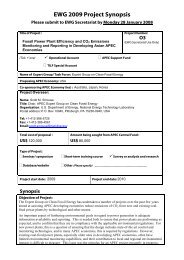EWG 2009 Project Synopsis
EWG 2009 Project Synopsis
EWG 2009 Project Synopsis
You also want an ePaper? Increase the reach of your titles
YUMPU automatically turns print PDFs into web optimized ePapers that Google loves.
<strong>EWG</strong> <strong>2009</strong> <strong>Project</strong> <strong>Synopsis</strong>Please submit to <strong>EWG</strong> Secretariat by Monday 28 January 2008Title of <strong>Project</strong> :Implementation of CO 2 Emission ReductionTechnologies and Methods for Fossil Fuel Installations<strong>Project</strong> Number:O4(<strong>EWG</strong> Secretariat Use Only)(Tick one) Operational Account APEC Support FundTILF Special AccountName of Expert Group/ Task Force: Expert Group on Clean Fossil EnergyProposing APEC Economy: USACo-sponsoring APEC Economy (ies) : Australia, Canada, Japan, Korea<strong>Project</strong> Overseer:Name: Scott M. SmouseTitle: Chair, APEC Expert Group on Clean Fossil EnergyOrganization: U.S. Department of Energy, National Energy Technology LaboratoryPostal address: P.O. Box 10940, Pittsburgh, PA 15236-0940, USATel: +1-412-386-5725Fax: +1-412-386-4561Email: scott.smouse@netl.doe.govTotal cost of proposal :US$ 160,000Amount being sought from APEC Central Fund :US$ 80,000Type of <strong>Project</strong>: Seminar/ symposium Short-term training course Survey or analysis and researchDatabase/websiteOther (Please specify) …………………………………………………<strong>Project</strong> start date: <strong>2009</strong> <strong>Project</strong> end date: 2010<strong>Synopsis</strong>Objective of <strong>Project</strong>:This objective of this project proposal is to organize and hold, jointly with the International EnergyAgency (IEA), an International Conference on Implementation of CO 2 Emission Reduction Technologiesand Methods for Fossil Fuel Installations. This event, which will be held during <strong>2009</strong>, will bringtogether the results from several APEC projects on various aspects of power plant best practices,including renovation and modernization and efficiency improvement — all which result in increased andmore reliable electricity generation, lower emissions of pollutants and carbon dioxide (CO 2 ), and reducedoperations and maintenance (O&M) costs leading to lower electricity tariff for consumers at all levels —from both existing and new coal-fired power plants in APEC economies. Its will focus on disseminationof information on reducing the contribution of fossil fuel power generation to greenhouse gas emissions,with the aim would be to help APEC developing economies improve the efficiency of power generationand reduce their emissions of CO 2 and other pollutants.
Methodology:During the past few years, the APEC Expert Group on Clean Fossil Energy (EGCFE) has beenconducting a number of inter-related projects on technological and other options to reduce present andfuture CO 2 emissions from electric power generation facilities in APEC economies. This has includedwork on coal-fired power plant upgrading and refurbishment options to improve plant efficiency,performance and reliability, as well as projects on new coal-fired power plants in APEC developingeconomies where coal use is on a rapid growth path, assessing what is needed to accelerate the uptake ofclean coal technologies in these economies, and on improved environmental monitoring 1 .The IEA has been carrying out a number of activities related to cleaner fossil fuels, in response to arequest by G8 Leaders at their Gleneagles Summit in 2005, which directed the IEA to review, assess, anddisseminate widely information on energy efficiency of coal-fired power plants; and to recommendoptions to make best practice more accessible. It also asked the IEA to make a global study of recentlyconstructed plants to assess which ones are the most cost-effective and have the highest efficiencies andlowest emissions, and to disseminate this information widely.The IEA response includes a coal-fired power database, assessment of upgrading and replacement ofolder coal-fired plants in major coal using economies (Australia, Brazil, China, India, Indonesia,Germany, Japan, Korea, Poland, Russia, South Africa, Thailand, United Kingdom, and United States),and country-based coal-fired power sector reviews, new developments and case studies of equipment andplant upgrades in different regions aiming at efficiency improvement.Given highly complementary nature of the work being undertaken by APEC and the IEA, and thetimetable for implementation of the anticipated G8 recommendations on efficiency improvement, it willbe highly beneficial, to both APEC and the IEA and their members, to jointly organize a conference onthese issues. The EGCFE Chair has discussed this joint event with responsible program officials at theIEA, who have indicated very strong interest in cooperating with the EGCFE. The IEA is alreadyplanning a series of workshops in developing countries around the world and quickly concluded that ajoint workshop in the Asia Pacific region would have much greater impact by bringing together keygovernment and private sector officials from a greater number of economies who all are or need to focuson this issue. A high-profile joint event of this type would also be consistent with the broad objective ofincreasing IEA/APEC coordination and cooperation that has been expressed by Energy Ministers of thetwo organizations. The Declaration by APEC Energy Ministers meeting in Darwin in 2007 encouragedthe development and implementation of APEC–IEA collaboration, and directed the <strong>EWG</strong> to furtheradvance collaboration with the IEA and other international energy fora.It would not be the first time that the two organizations (IEA and APEC/IEA) worked together. As partof a prior project series, the EGCFE organized an APEC workshop in 2004, on near-term options toreduce CO 2 emissions from coal-fired power plants in the region. This workshop was held inconjunction with a regional conference on Zero Emission Technologies (ZETs) sponsored by the IEA’sWorking Party on Fossil Fuels in Brisbane, Australia. The combined event benefited from thecomplementarity of the membership of the two organizations, and from substantial cofunding fromindustry and from the host economy.Upon approval by APEC and the IEA, a consultant would be selected who would work with a steeringteam of EGCFE members and the IEA Secretariat or its representative, to organize and hold theconference, and publish the proceedings.How does the project proposal align with <strong>EWG</strong> and APEC-wide priorities:This project will strengthen regional energy security by preserving the coal option while creating1 Reducing Trade, Regulatory, and Financing Barriers to Accelerate the Uptake of Clean Coal Technologies byDeveloping Economies in the Asia Pacific Region [<strong>EWG</strong> 01-2008T]How Can Environmental Regulations Promote Clean Coal Technology Adoption in APEC Developing Economies?[<strong>EWG</strong>05-2006]Environmental Monitoring for Coal-Fired Power Plants in Asian Developing APEC Economies [<strong>EWG</strong>06/2007]Technology Status and <strong>Project</strong> Development Risks of Advanced Coal-Fired Power Generation Technologies inAPEC Developing Economies [<strong>EWG</strong>06-2007A ]Lessons Learned in Upgrading and Refurbishing Older Coal-Fired Power Plants - A Best Practice Guide forDeveloping APEC Economies [<strong>EWG</strong>05-2007]
essential conditions for improving environmental protection in the power generation sector.The Declaration by APEC Energy Ministers meeting in Darwin in 2007 stated that improving energyefficiency is a cost-effective way to enhance energy security and mitigate greenhouse gas emissions, andMinisters encouraged the development of cleaner and more efficient power generation technologies.APEC Economic Leaders, meeting in Sydney in September 2007, addressed the challenges of climatechange, energy security and clean development, outlining their resolve on this issue in their Declarationon Climate Change, Energy Security and Clean Development, which included the following statements:• We, the APEC Economic Leaders, agree that economic growth, energy security and climatechange are fundamental and interlinked challenges for the APEC region.• Our success has relied in part on secure supplies of energy, the use of which has also contributedto air quality problems and greenhouse gas emissions.• We are committed, through wide-ranging and ambitious actions, to ensuring the energy needs ofthe economies of the region while addressing the issue of environmental quality and contributingto the reduction of greenhouse gas emissions.• Fossil fuels will continue to play a major role in our regional and global energy needs, Cooperation,including joint research, development, deployment and transfer of low and zeroemission technologies for their cleaner use, particularly coal, will be essential.• Improving energy efficiency is a cost-effective way to enhance energy security and addressgreenhouse gas emissions while promoting economic growth and development.This project responds to the energy efficiency goals of APEC Energy Ministers, in that its overallobjective is to contribute to mitigation of greenhouse gas emissions by dissemination of the most up-todateinformation on CO 2 emission reduction by improving the efficiency of existing fossil fuel powergeneration, and by facilitating the uptake of clean and efficient coal technologies for new powergenerating plants.The primary objective of the project is to contribute to mitigation of global climate change due to CO 2emissions by means of information transfer related to the environmentally sustainable use of coal forenergy development in the APEC region. Global climate change is expected to impact agriculturalproduction and the availability of water, and to cause sea levels to rise. These and other negative impactsof climate change more significantly impact the poor and disadvantaged, including often women. Thesesectors of human society are less able to afford to adapt to their changing surroundings.To ensure that the women’s perspectives are adequately represented, active participation of and input bywomen into the project will be sought through the members of the EGCFE steering committee.Cooperation in this endeavour by representatives of the IEA will also be sought. The project itself will becarried out by a consultant in response to a tender. In its evaluation of submitted bids, specific attentionwill be given to qualified women proposed by the consultants to work on the project. The EGCFEmembers involved will ensure that the winning submission adheres to the priorities of the Framework forthe Integration of Women in APEC (“Accelerate the progress of integrating women in the mainstream ofAPEC processes and activities” and “Promote and encourage the involvement of women in all APECfora”). The APEC Framework, as well as the Gender Analysis Guide and other relevant documents, willbe made available to those involved in the project; their application will be monitored throughout theproject.
INCORPORATING SUSTAINABLE DEVELOPMENT PRINCIPLES INTO <strong>EWG</strong>PROJECTSProcess for incorporating sustainable development principles:1. <strong>Project</strong> Overseer complete self-assessment rating for each project proposal2. For APEC-funded projects, <strong>Project</strong> Overseer incorporates the principles into the project tender, tenderassessment, and project implementation phases3. On completion of a project, the <strong>Project</strong> Overseer describes how the principles were addressed andtheir impact at the project evaluation phase (through a separate report).Sustainable DevelopmentPrincipleStrengthening regional energysecuritySupporting energy marketreform and energyinfrastructure developmentPromoting uptake of clean andefficient energy and efficientuse of energyBuilding capacity and technicalcooperation within APECeconomiesBuilding public-privatepartnerships and strengtheningstakeholder engagement,including with the APECbusiness communityTOTAL SCORE 5SELF-ASSESSMENT RATING<strong>Project</strong> Link(1 point forSupporting Informationeach)By disseminating information on improving theefficiency and performance of existing coal-fired powerplants, and on means of ensuring the accelerated1 deployment of cost-effective clean coal technologies fornew fossil power generation, this project will strengthenregional energy security by preserving the coal optionwhile addressing the climate change issue.The project will develop information that provides1 incentives for cleaner coal technology in new andexisting power generation infrastructure.This project will promote the uptake of cleaner andmore efficient coal power generation technologies, as1well as improvement of the efficient use of energy in11existing power plants.This project will help member economies build capacityin clean coal technologies as well as power plantupgrading, and provide opportunities for technicalcooperation on clean coal infrastructure development.The project will strengthen public-private sector dialogand encourage selection of clean coal technologies fornew and upgraded power plants, with private sectorinvolvement in APEC economies.


